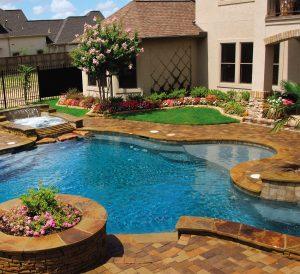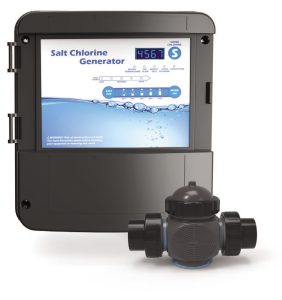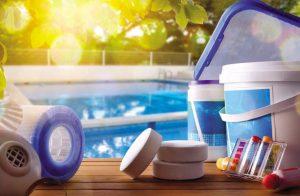 Summer is just around the corner, which means that it’s almost time to have some fun in the sun! Swimming pools are an incredible amenity to enjoy in the warmer months, but having and maintaining a pool can be overwhelming and confusing. The first thing to educate yourself on when building a pool or purchasing a home with a pool is whether you want saltwater or chlorine to keep things clean. These two options have some differences and some similarities. Chlorine pools have been around for much longer than saltwater pools, but recently many commercial pools have shifted to saltwater. Of course, there is no definitive answer when it comes to which pool is better. There are pros and cons to consider for both options and much to learn, so if you’re interested in finding out more, be sure to keep reading!
Summer is just around the corner, which means that it’s almost time to have some fun in the sun! Swimming pools are an incredible amenity to enjoy in the warmer months, but having and maintaining a pool can be overwhelming and confusing. The first thing to educate yourself on when building a pool or purchasing a home with a pool is whether you want saltwater or chlorine to keep things clean. These two options have some differences and some similarities. Chlorine pools have been around for much longer than saltwater pools, but recently many commercial pools have shifted to saltwater. Of course, there is no definitive answer when it comes to which pool is better. There are pros and cons to consider for both options and much to learn, so if you’re interested in finding out more, be sure to keep reading!
Saltwater Pools
 You may have the perception that the water in saltwater pools is just like that of the sea. This is most definitely false. Saltwater pools are very different from seawater. They even contain small amounts of chlorine produced through electrolysis, so they are not considered chlorine-free. Even though saltwater pools do possess chlorine, it is in a significantly lower amount than a chlorine pool would have. With minimal chlorine, this is a great choice for those who will be spending a large amount of time in the water, such as families with children or swimmers, as saltwater pools are gentle on skin, eyes, and swimwear.
You may have the perception that the water in saltwater pools is just like that of the sea. This is most definitely false. Saltwater pools are very different from seawater. They even contain small amounts of chlorine produced through electrolysis, so they are not considered chlorine-free. Even though saltwater pools do possess chlorine, it is in a significantly lower amount than a chlorine pool would have. With minimal chlorine, this is a great choice for those who will be spending a large amount of time in the water, such as families with children or swimmers, as saltwater pools are gentle on skin, eyes, and swimwear.
If building a saltwater pool, you will be required to purchase a generator, which usually costs between $1,200 and $1,500. With the use of the generator comes the use of electricity, meaning that your monthly electricity bill will increase but not too significantly. Another important cost to factor in is the replacement cells for the generator. Any generator will certainly need these to be replaced after a few years of use. To replace them, you can expect to spend anywhere from $200 to $700 each. Along with the generator, this kind of pool requires a pump to circulate the water.
These pools need minimal additives and attention due to the natural chlorine that they produce. This is great if you’re hoping to avoid a lot of work in terms of pool maintenance. In addition to being minimal work to maintain, saltwater pools are also reasonably priced to maintain in terms of chemicals and salt. Expect to spend around $70 to $100 each year on the chemicals for these kinds of pools.
A saltwater pool system is more complicated than that of a chlorinated pool, so any fixes will require a licensed, specialized technician’s skills. Prices vary between technicians and depending on the level of repair, so make sure to call around and find someone within your budget. It should also be noted that the chlorine that saltwater pools produce has a higher pH and is therefore corrosive. That means that it will cause damage to normal pool equipment and hardware after a few years of use; however, it isn’t significantly different than chlorine pools in this way. Both kinds of pools will do this to some extent, but saltwater pools may corrode just slightly more.
Chlorine Pools
 Many private citizens who own pools choose to use chlorine given the small cost up front. A key difference from saltwater pools is that rather than the chlorine being naturally created, these pools require chlorine to be added manually. They also use minimal electricity. Chlorine pools simply utilize a pump to circulate the water and cleaning equipment, which, in combination with the pump, prohibits the spread of soil, bacteria, and algae in the water.
Many private citizens who own pools choose to use chlorine given the small cost up front. A key difference from saltwater pools is that rather than the chlorine being naturally created, these pools require chlorine to be added manually. They also use minimal electricity. Chlorine pools simply utilize a pump to circulate the water and cleaning equipment, which, in combination with the pump, prohibits the spread of soil, bacteria, and algae in the water.
Additionally, these pools also require lots of maintenance to effectively clean the water and rid it of bacteria. For chlorine pools, much of the maintenance or repairs can be done yourself rather than hiring a technician, which is great for those who would rather do a DIY project than hire someone else. If you will be doing the maintenance yourself, do be sure to consider that chlorinated pools require other chemicals, including balancing agents, to be added regularly. The chlorine also needs to be properly stored in a moisture-free location. Lastly, the chemicals for a chlorine pool will cost about $300 to $800 each year.
Chlorine does not cause much damage to the various fixtures in a pool, such as the lights or decorations, so you can rest assured that they will not need replacing quite as often as a saltwater pool might require. On the downside, chlorine can be drying and harsh on hair, eyes, and skin. Additionally, it can fade swimwear. For those who swim in it often, it is not abnormal to buy special shower products to counteract the effects that these chemicals cause. Furthermore, chlorinated water can fade and harm a pool deck.
Despite the pros and cons of each kind of pool system, there is no true superior option. Choose a system based on your wants and needs for price and maintenance. Keep this information in mind when deciding which system is right for you, and enjoy your pool this summer! ![]()
Emily Schutz
Home & Yard Magazine




